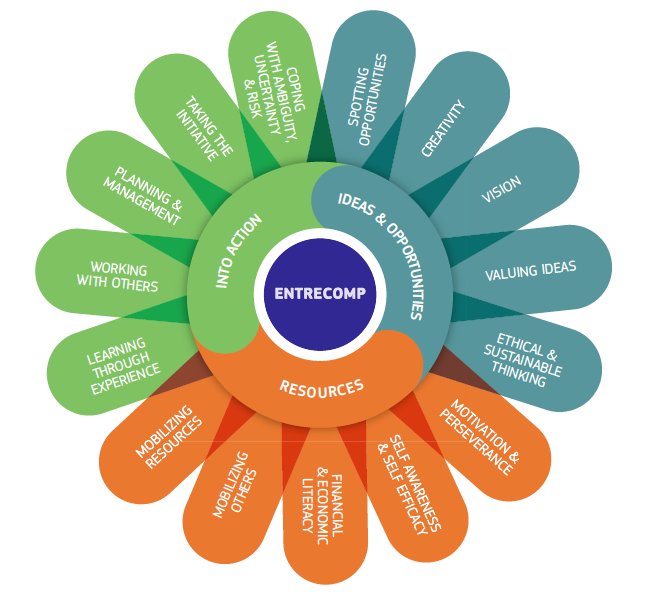Entrepreneurial skills encompass abilities such as creativity, leadership, risk-taking, adaptability, and persistence. These skills are essential for individuals who aim to initiate and manage business ventures.

Credit: www.mirrorreview.com
Table of Contents
The Importance Of Entrepreneurial Skills
Entrepreneurial skills are vital for success in business. These skills include adaptability, creativity, and leadership. They enable individuals to identify opportunities, take calculated risks, and drive innovation in the competitive business landscape. Mastering entrepreneurial skills can boost one’s ability to navigate challenges and capitalize on opportunities in the dynamic world of entrepreneurship.
Entrepreneurial skills are essential for success in today’s competitive business landscape. Whether you are looking to start your own business or climb the corporate ladder, having a strong set of entrepreneurial skills can give you a significant advantage. These skills are not only valuable for entrepreneurs but also for professionals in a wide range of industries.
Key Skills For Entrepreneurs
Developing and honing specific skills is crucial for entrepreneurs. Here are some key skills that every aspiring entrepreneur should possess:
- Critical Thinking: Being able to analyze situations, identify opportunities, and make informed decisions is vital for entrepreneurial success.
- Communication: Effective communication is crucial for networking, pitching ideas, and building relationships with customers, employees, and stakeholders.
- Adaptability: Entrepreneurs must be open to change and able to adapt their strategies and approaches as the business landscape evolves.
- Leadership: Strong leadership skills are necessary for guiding a team, setting goals, and inspiring others to achieve success.
- Financial Management: Understanding financial concepts, budgeting, and managing cash flow is essential for ensuring long-term sustainability.
Benefits Of Developing Entrepreneurial Skills
There are several benefits to developing entrepreneurial skills, regardless of whether you plan to start your own business or work within an existing organization:
- Career Advancement: Having entrepreneurial skills can open up new opportunities for career growth and advancement.
- Innovation: Entrepreneurial skills foster creativity and innovation, allowing individuals to think outside the box and find unique solutions to challenges.
- Problem-Solving: Developing entrepreneurial skills equips individuals with the ability to identify and solve problems effectively.
- Risk Management: Entrepreneurs must be skilled in assessing and managing risks, which can be beneficial in both professional and personal life.
- Self-Confidence: Developing entrepreneurial skills boosts self-confidence, as individuals become more capable and self-reliant.
- Opportunity Recognition: With strong entrepreneurial skills, individuals can identify and seize opportunities that others might overlook.
Key Entrepreneurial Skills
In today’s competitive business landscape, having the right entrepreneurial skills is crucial for success. These skills empower individuals to identify opportunities, take risks, and bring innovative ideas to life. Entrepreneurs need to possess a diverse set of skills that enable them to navigate challenges and drive their ventures forward. In this article, we will explore four key entrepreneurial skills: creativity and innovation, critical thinking and problem solving, financial literacy, and communication and networking.
Creativity And Innovation
Entrepreneurship thrives on creativity and innovation. The ability to think outside the box and generate unique ideas sets successful entrepreneurs apart from the rest. Creative thinking allows entrepreneurs to identify untapped markets, develop breakthrough products or services, and differentiate themselves from competitors. By embracing creativity and constantly seeking innovative solutions, entrepreneurs can stay ahead in a rapidly changing business landscape.
Critical Thinking And Problem Solving
An essential entrepreneurial skill is critical thinking and problem solving. Entrepreneurs must navigate complex challenges, make informed decisions, and overcome obstacles to bring their ideas to fruition. Critical thinking enables entrepreneurs to analyze situations objectively and consider various perspectives before taking action. By honing their problem-solving skills, entrepreneurs can effectively address issues, adapt to changing circumstances, and seize opportunities.
Financial Literacy
Financial literacy is a vital skill for entrepreneurs who aim to build sustainable ventures. Understanding the fundamentals of finance helps entrepreneurs make sound financial decisions, manage cash flow effectively, and assess the financial health of their businesses. Moreover, it enables entrepreneurs to secure funding, negotiate partnerships, and strategically allocate resources. By developing financial literacy, entrepreneurs can ensure the long-term viability and growth of their ventures.
Communication And Networking
Effective communication and networking are essential skills that enable entrepreneurs to build relationships, connect with stakeholders, and seize opportunities. Entrepreneurs must communicate their vision, value proposition, and goals clearly to investors, employees, customers, and partners. Networking allows entrepreneurs to expand their professional circles, establish strategic partnerships, and gain valuable industry insights. By mastering communication and networking, entrepreneurs can build a strong support network and enhance their chances of success.
In conclusion, developing these key entrepreneurial skills – creativity and innovation, critical thinking and problem solving, financial literacy, and communication and networking – is crucial for aspiring entrepreneurs. By cultivating these skills, entrepreneurs can navigate challenges, seize opportunities, and drive their ventures to success.
Developing Entrepreneurial Skills
Developing entrepreneurial skills is essential for aspiring entrepreneurs to succeed in their business ventures. These skills can be learned through various methods such as educational programs and courses, as well as practical experience and mentorship. By honing these skills, entrepreneurs can enhance their ability to identify opportunities, take risks, and make informed decisions to grow their businesses.
Educational Programs And Courses
Entrepreneurial skills can be acquired through educational programs and courses that focus on business management and entrepreneurship. These programs provide aspiring entrepreneurs with a solid foundation of knowledge in areas such as marketing, finance, leadership, and innovation.
Key benefits of participating in educational programs and courses include:
- Gaining theoretical knowledge and understanding of business principles
- Learning from experienced professors and industry experts
- Networking opportunities with like-minded individuals
- Access to resources and tools that support entrepreneurial endeavors
By actively engaging in these programs, entrepreneurs can acquire the necessary knowledge and skills to start and manage their own businesses successfully.
Practical Experience And Mentorship
While theoretical knowledge is essential, practical experience and mentorship play a crucial role in developing entrepreneurial skills. Real-life experiences provide entrepreneurs with valuable insights into the challenges, risks, and rewards of running a business.
Some ways entrepreneurs can gain practical experience and mentorship include:
- Starting a small business or working in a startup environment
- Interning or working for successful entrepreneurs or industry leaders
- Joining networking groups or communities to connect with experienced mentors
- Participating in incubators or accelerators that offer guidance and support
Through practical experience and close guidance from mentors, entrepreneurs can learn vital skills such as problem-solving, decision-making, and adaptability. These skills are often best acquired through hands-on experiences and real-world challenges.
In conclusion, developing entrepreneurial skills requires a combination of educational programs, courses, practical experience, and mentorship. By actively participating in these opportunities, aspiring entrepreneurs can enhance their knowledge, gain practical insights, and improve their chances of success in their entrepreneurial pursuits.

Credit: www.linkedin.com
Challenges In Acquiring Entrepreneurial Skills
Acquiring entrepreneurial skills is undoubtedly a challenging journey filled with trials and tribulations. Aspiring entrepreneurs must navigate through various hurdles to develop the essential skills needed to succeed in the competitive business world. In this section, we will discuss two prominent challenges aspiring entrepreneurs often face: overcoming the fear of failure and managing uncertainty and risk.
Overcoming Fear Of Failure
One of the biggest obstacles that often plague budding entrepreneurs is the fear of failure. The fear of failing can be paralyzing, preventing individuals from taking risks and exploring new opportunities. However, it is crucial to understand that failure is an inevitable part of the entrepreneurial journey. Embracing failure as a learning opportunity can lead to invaluable lessons and growth.
To overcome the fear of failure, aspiring entrepreneurs need to shift their mindset. Rather than viewing failure as a setback, it should be seen as a stepping stone towards success. Embracing a growth mindset allows entrepreneurs to bounce back from failure, adapt to challenges, and persevere in the face of adversity.
Managing Uncertainty And Risk
Another significant challenge in acquiring entrepreneurial skills is managing uncertainty and risk. Starting a new venture inherently involves a level of uncertainty, and entrepreneurs must learn how to navigate unpredictability to make informed decisions.
To effectively manage uncertainty and risk, entrepreneurs need to develop a variety of skills. They must possess a strong analytical mindset to evaluate potential risks and rewards. Additionally, effective planning and strategizing can help mitigate risks and maximize opportunities.
Furthermore, successful entrepreneurs need to be adaptable and flexible. In a rapidly changing business landscape, being able to adjust strategies and pivot when necessary is crucial.
Moreover, connecting with mentors and seeking guidance from experienced entrepreneurs can provide invaluable insights in managing uncertainty and risk. Learning from the experiences of others can help entrepreneurs make informed decisions, minimizing potential pitfalls.
In summation, acquiring entrepreneurial skills is not a journey without challenges. Overcoming the fear of failure and managing uncertainty and risk are two significant hurdles entrepreneurs must face. However, with the right mindset, perseverance, and a willingness to learn, aspiring entrepreneurs can develop and refine their skills, setting themselves on the path to success in the dynamic world of entrepreneurship.
Measuring Entrepreneurial Skills
Measuring entrepreneurial skills is essential for both aspiring and established entrepreneurs. It involves evaluating the key qualities that contribute to entrepreneurial success, such as creativity, risk-taking, and leadership. By understanding and quantifying these skills, individuals can identify areas for improvement, capitalize on their strengths, and increase their chances of success in the competitive business landscape.
Assessment Tools And Techniques
Entrepreneurial skills can be measured using a variety of assessment tools and techniques, many of which have been developed specifically for this purpose. These include personality assessments, such as the Myers-Briggs Type Indicator (MBTI) and the DISC assessment, which can provide insights into an individual’s strengths, weaknesses, and preferred work styles. Additionally, cognitive ability tests, such as the Watson-Glaser Critical Thinking Appraisal, are helpful for evaluating problem-solving and decision-making abilities, both crucial for entrepreneurial success.
Success Stories
Another effective way to measure entrepreneurial skills is by studying success stories of prominent entrepreneurs. Examining the journeys of individuals like Elon Musk, Oprah Winfrey, and Jeff Bezos can provide valuable insights into the characteristics and behaviors that have contributed to their success. Analyzing these success stories can help aspiring entrepreneurs identify common traits, strategies, and mindsets that are essential for thriving in the entrepreneurial world.

Credit: savestartups.erasmus.site
Frequently Asked Questions For What Are The Entrepreneurial Skills?
What Are Entrepreneurial Skills?
Entrepreneurial skills are the abilities needed to start and run a business successfully. These skills include creativity, problem-solving, leadership, communication, and adaptability. They are crucial for identifying opportunities, taking risks, and managing resources effectively.
What Are The Three 3 Entrepreneurial Skills?
The three entrepreneurial skills are creativity, problem-solving, and risk-taking.
What Are The Four 4 Types Of Entrepreneurship?
The four types of entrepreneurship are small business entrepreneurship, scalable startup entrepreneurship, social entrepreneurship, and corporate entrepreneurship. Each type focuses on a different approach and goal in the world of business.
Conclusion
To summarize, developing entrepreneurial skills is crucial for individuals aspiring to succeed in today’s competitive business landscape. By honing skills such as leadership, innovation, communication, and risk-taking, entrepreneurs can navigate challenges and seize opportunities. These skills empower them to not only create and manage successful ventures, but also contribute positively to the economy.
By continuously learning and adapting, entrepreneurs can stay ahead of the curve and thrive in an ever-evolving business world.
